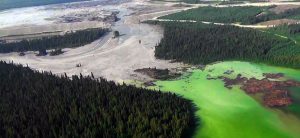 Following a four-year period of writing, member comment, and multiple revisions, the AFS Position Paper and Policy on Mining and Fossil Fuel Extraction was approved unanimously by the membership at the Society’s annual business meeting August 19, 2015, in Portland, Oregon. Read the entire document online or see the January 2016 issue of Fisheries for a summary. The Policy Statement follows below.
Following a four-year period of writing, member comment, and multiple revisions, the AFS Position Paper and Policy on Mining and Fossil Fuel Extraction was approved unanimously by the membership at the Society’s annual business meeting August 19, 2015, in Portland, Oregon. Read the entire document online or see the January 2016 issue of Fisheries for a summary. The Policy Statement follows below.
AFS Policy Statement
Mines and wells should only be developed where, after weighing multiple costs, benefits, beneficiaries, and liabilities, they are considered the most appropriate use of land and water by affected publics, can be developed in an environmentally responsible manner, benefit workers and affected communities, and are appropriately regulated. Because of substantial widespread adverse effects of mining and wells on aquatic ecosystems and related human communities, fossil fuel combustion effects on global climate, and enormous unfunded reclamation costs for abandoned extraction sites, the American Fisheries Society (AFS) recommends substantive changes in how North American governments conduct environmental assessments and permit, monitor, and regulate mine and fossil fuel development. In particular, AFS recommends that:
- Following a formal environmental impact assessment, the affected public should be involved in deciding whether a mine or well is the most appropriate use of land and water, particularly relative to the need to preserve ecologically and culturally significant areas.
- Mine or well development should be environmentally responsible with regulation, treatment, monitoring, and sureties sufficient for protecting the environment in perpetuity.
- Baseline ecological and environmental research and monitoring should be conducted in areas slated for mining and fossil fuel extraction before, during, and after development so that the effects of those industries can be assessed in an ecologically and statistically rigorous manner, and the resulting data should be made publicly available.
- This policy and related research should help inform the process of responsible resource development for mining and fossil fuel extraction, and should guide the implementation of the precautionary principle for those sectors.
- A formal risk assessment of the cumulative atmospheric, aquatic, and oceanic effects of continued fossil fuel extraction and combustion should be conducted and reported to the public.
- A formal risk assessment of the cumulative aquatic and oceanic effects of continued hard rock and aggregate extraction and metals smelting should be conducted and reported to the public.
